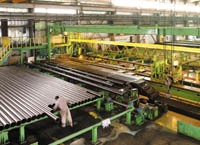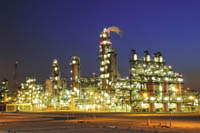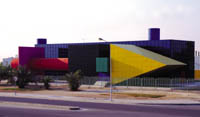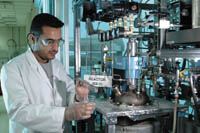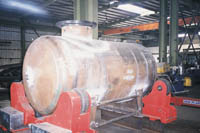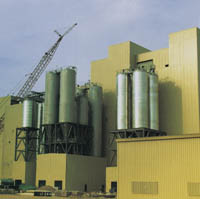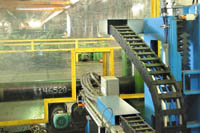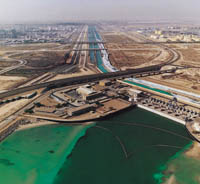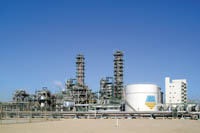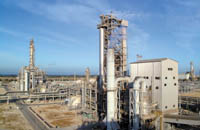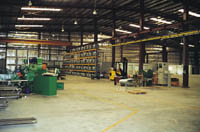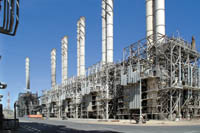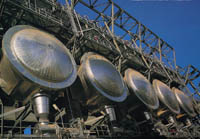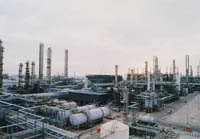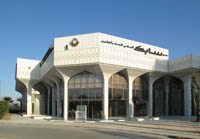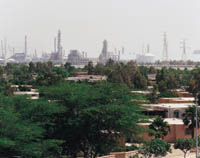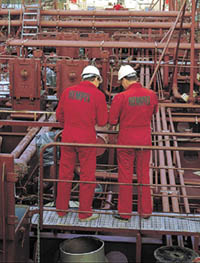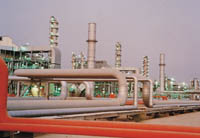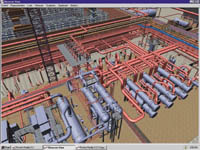
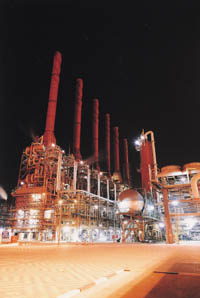 The Qapco facility ... increasing global product recognition
The Qapco facility ... increasing global product recognition
Qatar Petrochemicals Company (Qapco), whose net profits surged 14.2 per cent to million ($117 million) last year from QR373 million in the previous year, has indicated it is studying the possibility of increasing ethylene production capacity to 720,000 tonnes by debottlenecking the existing plant.
The capacity increase is being contemplated on the basis there will be increased feed gas supplies from Qatar Petroleum (QP).
Also on the cards are proposals to increase low density polyethylene (LDPE) capacity at Qapco and ethylene dichloride (EDC) capacity at Qatar Vinyl Company (QVC), whose production facilities are integrated with those of Qapco in the Messaieed Industrial Area near Doha.
Qapco was established in 1974. Its manufacturing facilities comprise an ethylene plant with an annual capacity of 525,000 tonnes per year (tpy), two LDPE plants (total capacity 360,000 tpy) and a sulphur plant (70,000 tpy) along with utilities and other offsite and auxiliary facilities.
The capacities of ethylene and LDPE increased to current levels from mid-1996 as a result of an expansion undertaken between 1993 and 1995. The feedstock, ethane gas, is supplied by QP for the production of ethylene, a significant part of which is then used in the production of various LDPE grades marketed under the Lotrene brand name.
Qapco is 80 per cent owned by QP, which was established in 1974 as a wholly owned corporation by Qatar and is responsible for developing and distributing the country's oil and gas reservoirs and promoting downstream industries in the state.
Other shareholders are Atofina (formerly Elf Atochem) of France and EniChem of Italy, each holding a 10 per cent stake. Atofina, which has interests in chemicals, is a wholly-owned subsidiary of leading oil company TotalFinaElf. EniChem is a petrochemical group controlled by the Italian state-owned entity Eni.
Qapco reported it achieved ethylene production of 406,000 tonnes against designed capacity of 525,000 tpy, attributing the lower production to a general shutdown (GSD) for maintenance during two months. Other statistics at the ethylene plant were: ethane rich gas processed was 618,000 tonnes, stripped associated gas processed 1.041 million tonnes and stream factor recorded 95 per cent (out of GSD).
Ethylene sales totalled 80,000 tonnes last year when the overall price increase was 42 per cent compared with 1999. India and Indonesia were the largest buyers. Also during 2000, the ethane recovery unit's revamping project was successfully completed with feed gas processing capability increasing from 153 tonnes per hour to 200. The ethylene production was set to increase by about 30,000 tonnes.
The LDPE plant also benefited from good prices, leading to some 327,000 tonnes being sold. The price realisation was 18 per cent higher than in the previous year with the Middle East and the Far East remaining the largest buyers, region-wise.
The sulphur plant produced 37,000 tonnes while capacity was 70,000 tonnes. India remained the sole buyer.
Qapco has said its marketing policies were ''aggressive in nature'', its strategies had ''long-term effects'' and prospective markets were ''studied and monitored in detail,'' resulting in ''enhanced penetration levels and increasing global recognition for our products.''
''The coverage of our marketing infrastructure/agent network extends to more than 4,000 customers in over 70 countries on a regular basis,'' said Qapco.
''The advantage of a unique strategic geographical location in the Middle East gives us easy access to customers worldwide which in turn facilitates faster execution of orders, increased turnover and improved customer satisfaction.
''Utilising the latest information technologies, orders are expedited through our head office and worldwide representative offices. Rapid processing results in the cost-effective despatch of products from plant site to customer destinations via land and sea.''
''Qapco's consistent efforts in the past showed the results of its presence in the global scenario. Its business strategy has been in line with the successfully adopted approach of an ideal petrochemical business which in terms of size, technology, product flexibility and process integration matches global standards,'' said Qapco chairman and Qatari Minister of Energy and Industry Abdullah bin Hamad Al Attiyah.
''All these are aimed at delivering high-quality products to its customers at a competitive price with quality service and reliability. Because of this successful approach, Qapco is now able to sustain itself in the present competitive environment.''
The role of Qapco in the context of economic development in Qatar has been significant.
Indeed, Qapco successes have led to further development of other petrochemical industries in Qatar.
It is also continuing to fulfil its commitment towards Qatari society, its shareholders and its customers, and, in the process, assuming more and more responsibilities towards them to play an anchor role in the years to come.
''Qapco now finds itself at a very interesting crossroads, where success will be dictated by its ability to capitalise on future opportunities within the constraints of its resources,'' said Al Attiyah.
''With a total quality management approach, proven technological capabilities, stringent quality control, cost effectiveness, marketing capabilities and field-proven quality products coupled with dedicated services from competent manpower, it should not be difficult for it to achieve this mission with ease.'' the Minister added.
He said that ''forward integration'' in the petrochemical sector was seen as the main way to expand directly or indirectly Qatar's oil- and gas-based industries with a view to diversifying the national income and expanding the economic base.
Projects Qapco has participated in with QP and other shareholders, local and foreign, include Qatar Vinyl Company (QVC) and Qatar Plastic Products Company (QPPC).
Quality, safety and the environment continue to remain a key area of commitment for the ISO9002-certified company.
The LDPE and ethylene plants maintain excellent safety levels, while, in a commitment to the environment, Qapco is harnessing all its efforts towards achieving he 15014001 certification on environment management and protection.
Several environment protection projects had been implemented, including an Environment Monitoring Programme, and the company has provided sufficient funds for an advanced laboratory for field sampling and analysis of wastewater effluents and emissions.
Embracing the electronic age with open arms, Qapco has developed an online portal called 'My Qapco', used to deliver information and services to the employee specific to his role within the organisation.
Qapco's development team used Oracle's J Developer and PL SQL cartridges to create a Java Development framework.
Qapco is now focusing on rolling out a similar 'Customer Portal', closely followed by a 'Partner Portal' and eventually a 'Supplier Portal'.







































































